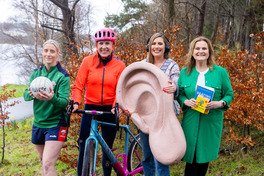After the excesses of the festive season, many of you will be looking at ways to boost your physical health. But what about the health of your brain? It is, after all, your most important organ. Your brain is responsible for everything you do - it keeps you alive, produces the emotions you feel and underlies your ability to think, feel, make decisions and so much more. Everyone should consider their brain health and I am on a mission to get you looking after your brain health as routinely as you brush your teeth!
Your brain is constantly changing, and your behaviours and experiences in life shape it. This is because the human brain is very responsive to its environmental influences. What you do, and indeed what you don’t do, influences how your brain will react to challenges such as ageing, injury and disease. Adopting a brain-healthy lifestyle is like investing in brain capital; it can be cashed in at some point in the future to cope with or compensate for damage, decline and diseases, such as dementia, which affect the brain.
We tend to attribute a great deal of importance to our genes and often forget about the many influences that lifestyle choices create, especially when it comes to risk factors such as dementia. One common misconception about dementia is that it is a normal part of ageing – it is not.
Another misconception is that dementia is inherited. The truth of the matter is that when it comes to dementia, the genetic risk is small when compared to the risk associated with lifestyle factors. In fact, 40% of all cases of Alzheimer’s disease have potentially been linked to these 10 modifiable risk factors:
- Hearing loss
- High blood pressure
- Obesity
- Excess alcohol consumption (over 21 units per week)
- Smoking
- Depression
- Social isolation
- Physical inactivity
- Air pollution
- Low levels of education and mental stimulation
In 2023, you should consider getting your hearing checked regularly, as this is a fantastic way to catch any deterioration and compensate for it early on.
Get your hearing tested immediately if you:
- Struggle to follow conversations
- Have a sense that everyone around you is mumbling
- Have the TV turned up too loud
- Find yourself unable to identify the direction of sounds
- Hear a buzzing or ringing in your ears
Don’t be like the vast majority who wait up to 10 years before doing something about hearing loss. In addition to reducing your quality of life by interfering with your ability to fully participate socially, untreated hearing loss can lead to social withdrawal and depression, which also increase your risk for developing dementia. The sooner you act on suspected hearing loss, the better. You may find that your hearing impairment is temporary, caused by excess earwax.
Even if you do discover that you need a hearing aid, the good news is that research shows that wearing one reduces the excess risk of developing dementia associated with hearing loss. It is never too early or too late to boost your brain health. Start now with your first hearing test and make it an annual hearing health habit.
Other ways to reduce your risk of developing dementia, boost your brain health and maximise your memory include staying physically, mentally, and socially active, adopting a Mediterranean diet and maintaining a healthy weight, prioritising sleep, and actively managing stress and depression. Get your blood pressure assessed and, if necessary, treated. Wear helmets, seat belts and take every safety precaution to prevent head injury. Quit smoking and avoid excessive alcohol consumption; doing a ‘dry month’ is an effective way to get on track.
Additional Tips
Smile More
Crack a smile wherever and whenever you can, especially if you don’t feel like it. Smiling releases chemicals that boost your mood and help reduce stress levels. Even a fake smile can make you feel calmer and more relaxed. Add smiling onto something you do routinely to make it habitual. Smile when you walk, smile when you clean or while you wait for the kettle to boil. Smiling is contagious so share yours today.
Sit Less
Sit less and stand more. Commit to standing more to do certain work tasks like taking phone calls. At home, break long spells of watching sport by standing for throw-ins and penalties. Reduce your daily sitting time from 8 hours to 6 - those 2 extra hours standing is the equivalent of running six marathons a year. Becoming more active boosts brain performance, reduces stress and improves sleep.
Sleep Soundly
Improve the quality of your sleep by managing your exposure to light. Use only low-level lighting from around 8pm. An hour before bed, shut down any devices that emit a blue light. Avoid turning on a bright bathroom or bedroom light immediately before getting into bed and make your room as dark as possible for sleeping. You need to sleep so that your brain can consolidate memories and make space for new incoming information the next day. In the absence of sufficient, good quality sleep, your brain can’t clear the metabolic waste and toxins, leaving you feeling sluggish and irritable and your brain vulnerable to dementia.
Wishing you all health and happiness for 2023.






